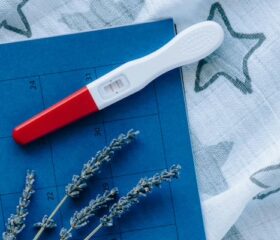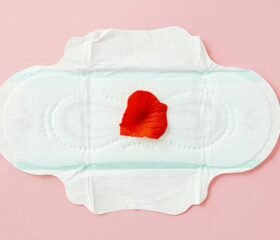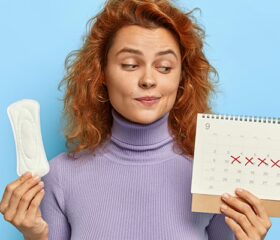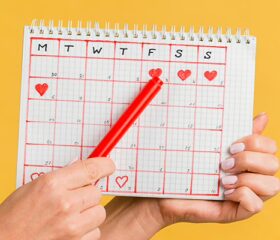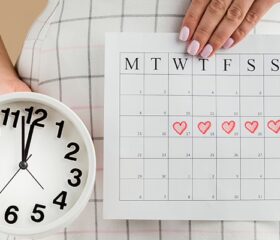Can You Get Pregnant on Your Period?
Whether you’re actively trying to conceive or you want to avoid it at all costs, you may have wondered if getting pregnant during your period is possible. The answer is yes—but it’s quite unlikely.
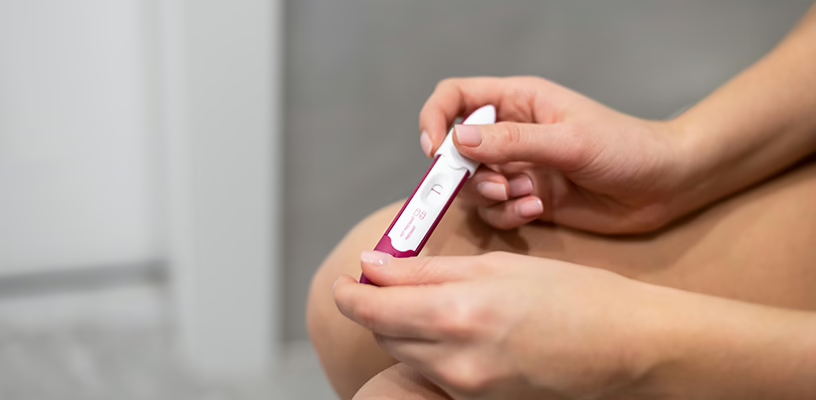
You’re less fertile when you’re on your period, but there are no real timeframes when you can count on being completely safe from getting pregnant.
Read on to learn about the factors that can cause you to conceive even when you’re on your period.
Understanding your menstrual cycle and fertility window
Before delving into how you can get pregnant during your period, let’s go over the basics of your menstrual cycle and fertility window.
If you have a regular menstrual cycle, it will typically last around 28 days. This means there are 28 days between the first day of your period and the last day of your (next) period. Note that cycle lengths can vary from woman to woman and even month to month. 1
When are you most likely to get pregnant?
Ovulation is when your ovary releases a mature egg into your fallopian tube, where it can survive for 24 hours as it waits to be fertilized by a sperm. If you have a “normal” 28-day cycle, you’ll usually ovulate between days 11–14.
Since sperm can live up to 5 days in a woman’s body, you’re most likely to get pregnant if you have sex during the 5 or so days leading up to your ovulation. 2
After ovulation, your uterus lining, which is rich in blood and nutrients, thickens to prepare for a potential pregnancy. If a sperm is able to reach your egg and fertilize it, a baby may soon be on the way. On the other hand, if the egg isn’t fertilized, your uterine lining sheds, resulting in menstruation (period), which usually lasts about 5 days. 3
How is it possible to get pregnant on your period?
As you can see, if you have a regular 28-day menstrual cycle, your likelihood of getting pregnant during your period is fairly low. Even if you have sex on the last day, the sperm will probably die by the time your body produces a new egg.
However, this doesn’t mean the chances of getting pregnant on your period is 0%. That’s because periods and menstrual cycles can be quite unpredictable.
Sex during your period can still result in conception if you have a:
- Short menstrual cycle: If you have a shorter cycle (e.g., 21 days or less), you may ovulate sooner after your period ends. 4 Having sex towards the end of your period could potentially lead to the sperm surviving until you ovulate.
- Long period: If you have a longer period (e.g., 7 days or more), the time between the last day of your period and your ovulation date will be shorter. This increases the chances of the sperm remaining viable until ovulation if you have sex towards the end of your period.
If you pair the two—a short menstrual cycle and a long period—then the chances of getting pregnant during your period are even higher.
Because you can’t time the exact length of your menstrual cycle and period, tracking your monthly cycle isn’t a completely reliable birth control method.
Additionally, some women experience light bleeding or spotting when they ovulate. 5 If you mistake this spotting or bleeding for your period and have unprotected sex, it can lead to pregnancy (and, in fact, is quite likely to, since this is a fertile time).
Can you get pregnant right before your period?
The chances of getting pregnant right before your period are very slim. The closer you are to your period, the further away you are from your ovulation, and the less likely you are to get pregnant.
As mentioned, an egg can only live for up to 24 hours after ovulation. 2 If you have a regular menstrual cycle, your egg most likely won’t be viable anymore by the time that your period approaches.
With all that said, it can be hard to predict your ovulation dates if you have irregular periods (which are most likely in early puberty or when you’re nearing menopause, but can happen at any time). 6 7 The upshot is that there’s a chance you might get pregnant right before your period. It’s a small chance, but a real one.
Can you get pregnant on the first day of your period?
Similarly, the likelihood of getting pregnant if you have sex on the first day of your period is low, but not zero.
Normally, your egg will no longer be viable on the first day of your period (and, in fact, its failure to be fertilized is what triggers your period in the first place). It’s also very unlikely for sperm to survive until your next ovulation.
With that said, you shouldn’t completely cross out the possibility on the off chance you have a highly irregular period and ovulation date. Various factors, such as weight loss or gain, stress, and certain medical conditions (e.g., polycystic ovary syndrome), can affect your menstrual cycle in unpredictable ways. 8 In extreme cases, this could cause you to ovulate much sooner than you expected.
Can you get pregnant right after your period?
Yes, you’re more likely to get pregnant right after your period than at the beginning of it. It’s still relatively unlikely, but the further you move from the onset of your period, the closer you are to your next ovulation and the more likely you are to get pregnant.
Can you get pregnant on your period if you’re on birth control?
Yes, you can get pregnant on your period if you’re on birth control, although the chances are much lower than when you have unprotected sex.
While hormonal birth control methods like the pill, patch, or ring are highly effective when you use them correctly, there’s still a small chance of pregnancy, regardless of where you are in your cycle. There aren’t any birth control methods (besides abstinence) that are 100% effective.
Here’s an overview of the “typical use” failure rates for common birth control methods according to the Centers for Disease Control and Prevention (CDC): 9
- IUDs and implants: Less than 1% failure rate
- Injections: About 4% failure rate
- Oral contraceptives (pills), patches, and rings: About 7% failure rate
- Diaphragms: About 17–22% failure rate
- Male condoms: About 13% failure rate
- Female condoms: About 21% failure rate
- Spermicides: About 21% failure rate
- Vasectomy and tubal surgery: Less than 1% failure rate. With tubal ligation (also known as getting your “tubes tied,”) your tubes can grow back together (known as recanalization), which can result in egg fertilization by sperm, and ultimately, pregnancy.
As discussed earlier, tracking your monthly cycle and understanding your fertility window, known as fertility awareness methods or natural family planning, are generally less reliable than other methods. They have failure rates as high as 23%.
Note that the “pull out” or withdrawal method isn’t as reliable as other forms of birth control (in practice, it’s only about 78% effective). That’s because it’s very hard to execute correctly and because you have a small but real chance of getting pregnant from precum. If you do use this method, make sure you use it in combination with one of the more reliable ones listed above.
Final thoughts
Getting pregnant during your period is unlikely but not impossible. If you aren’t trying to conceive and don’t want any surprises, it’s best to use birth control consistently, whether you’re on your period or not.
You should still understand your menstrual cycle and fertility window to keep your reproductive health in check. If you have irregular menstrual cycles or are having issues getting pregnant, don’t hesitate to see a doctor for further evaluation.
Article Sources
- Office on Women's Health. "Your menstrual cycle" Retrieved April 8, 2025.
- MedlinePlus. "Pregnancy - identifying fertile days" Retrieved April 8, 2025.
- Office on Women's Health. "The menstrual cycle" Retrieved April 8, 2025.
- The BMJ. "The timing of the “fertile window” in the menstrual cycle: day specific estimates from a prospective study" Retrieved April 8, 2025.
- Medical News Today. "What to know about ovulation spotting or bleeding" Retrieved April 8, 2025.
- Tommy’s. "Understanding your menstrual cycle" Retrieved April 8, 2025.
- Breastcancer.org. "Peri-menopause and Irregular Periods" Retrieved April 8, 2025.
- Johns Hopkins Medicine. "Polycystic Ovary Syndrome (PCOS)" Retrieved April 8, 2025.
- U.S. Centers for Disease Control and Prevention. "Contraception and Birth Control Methods" Retrieved April 8, 2025.
